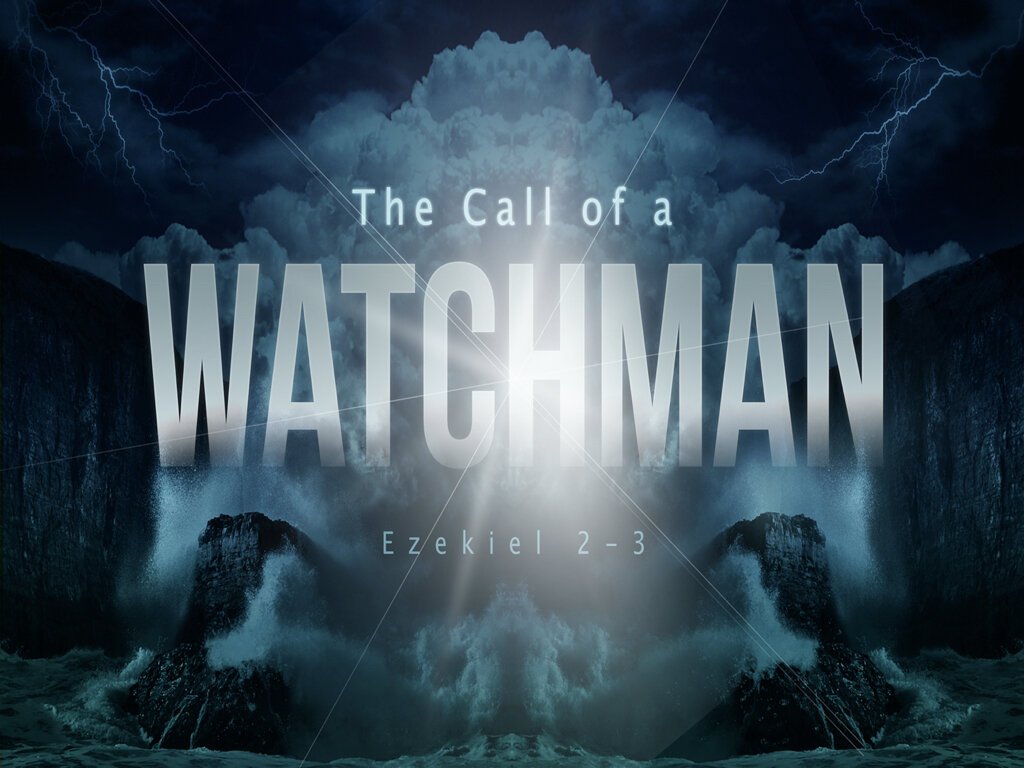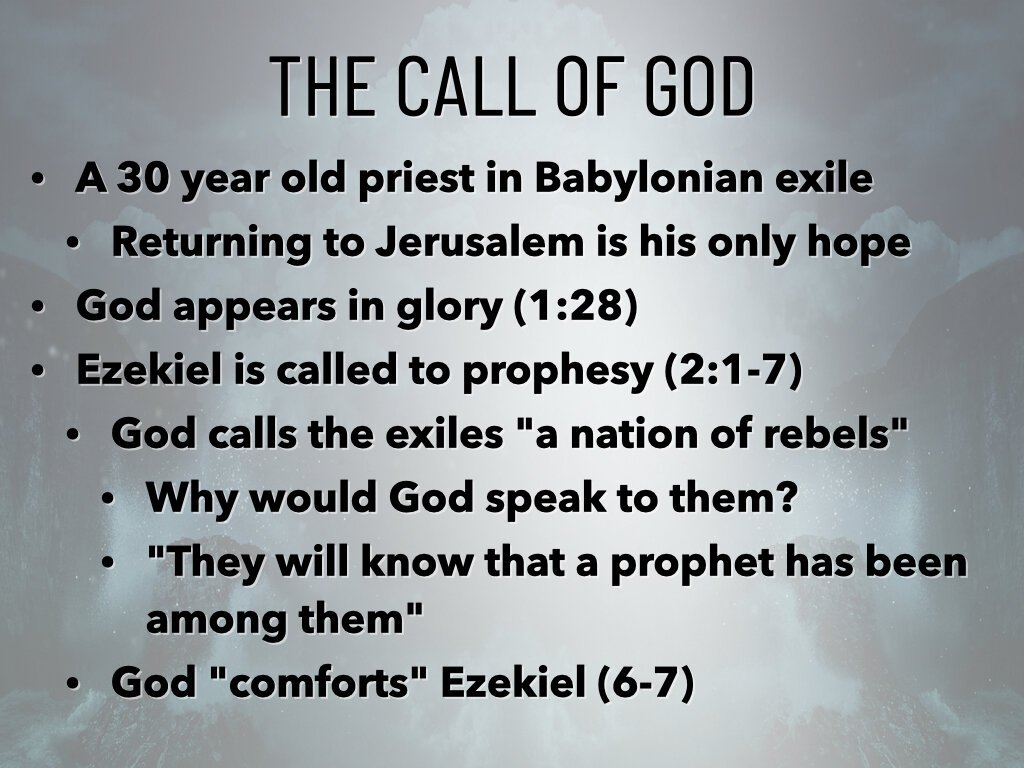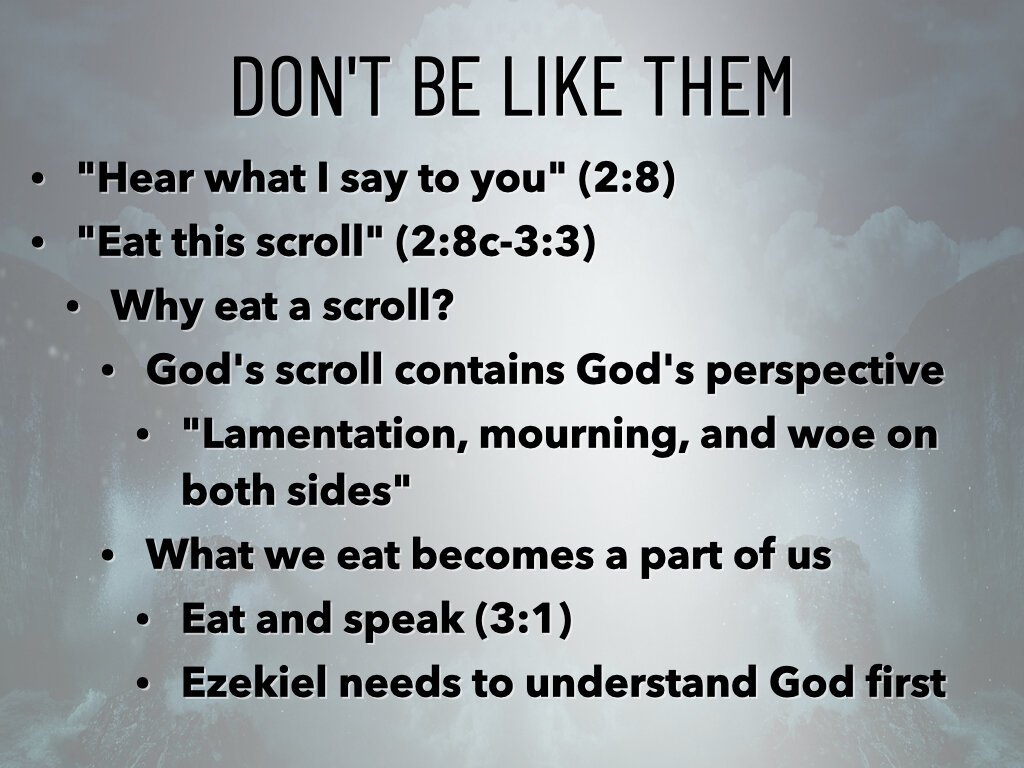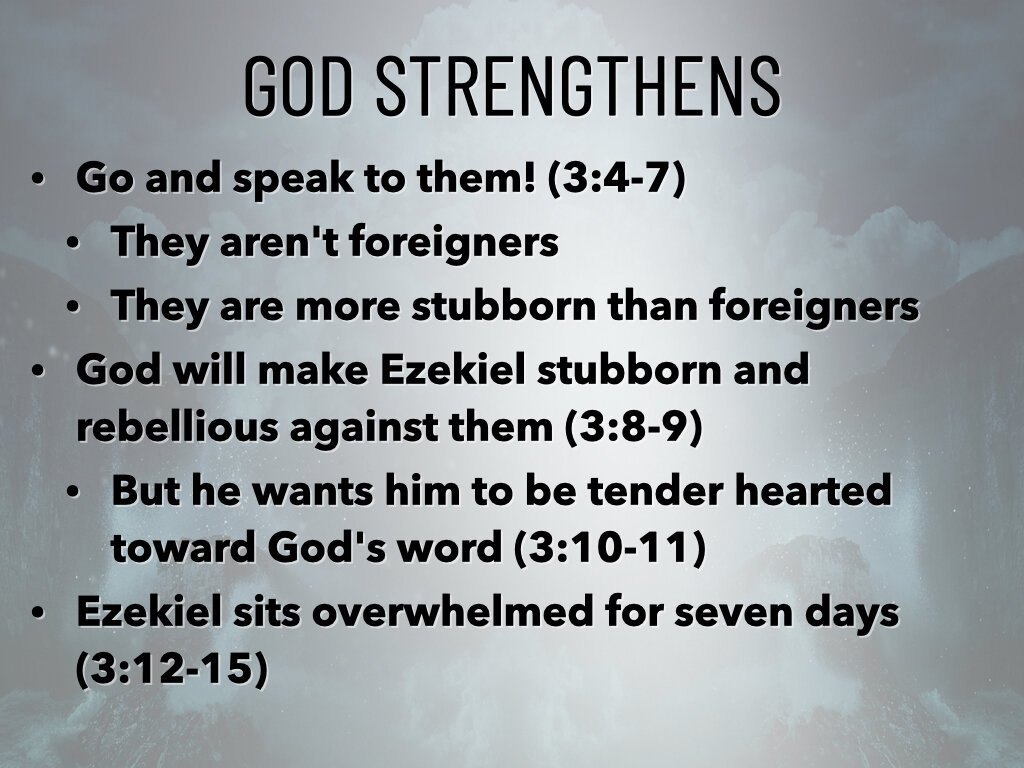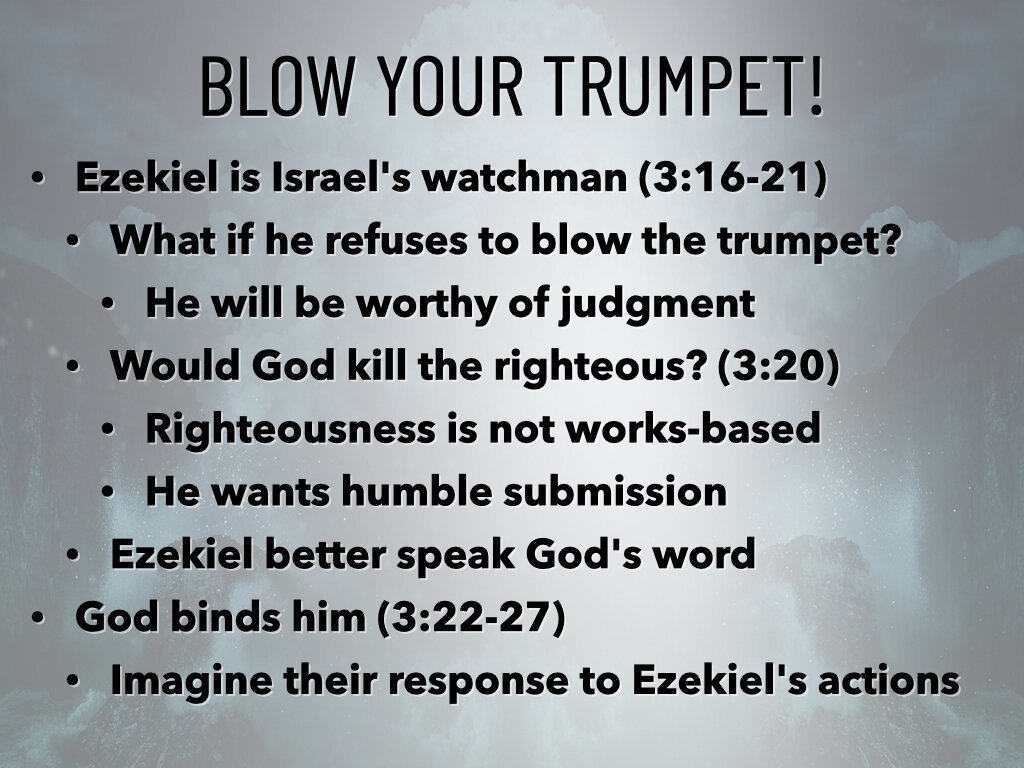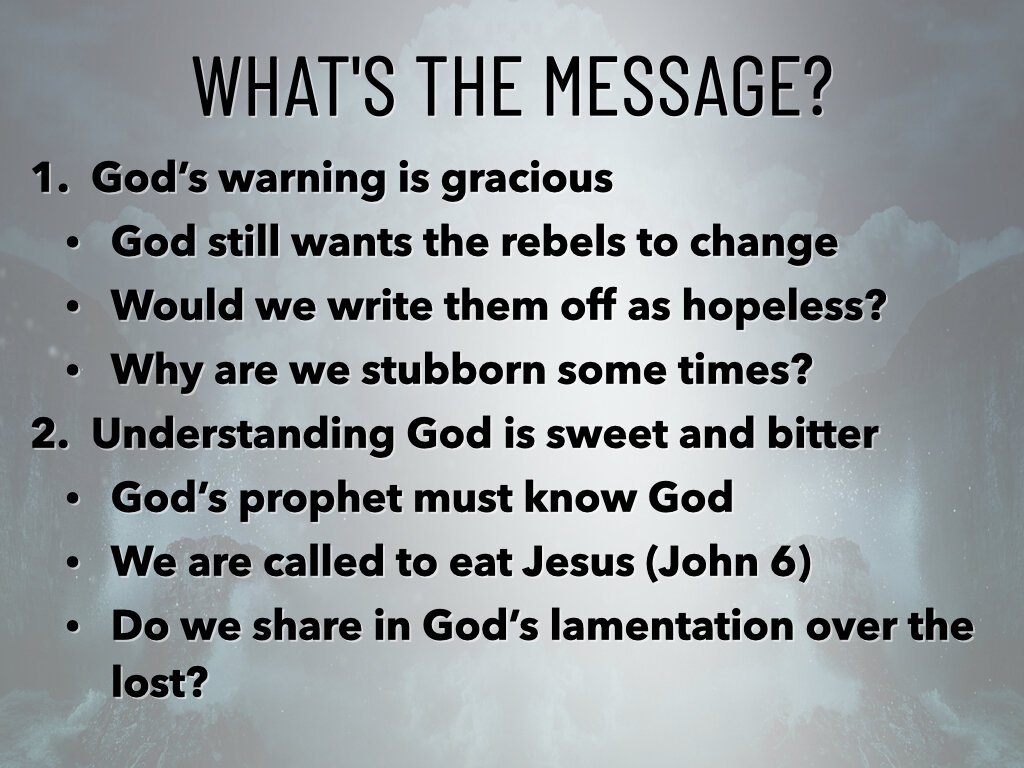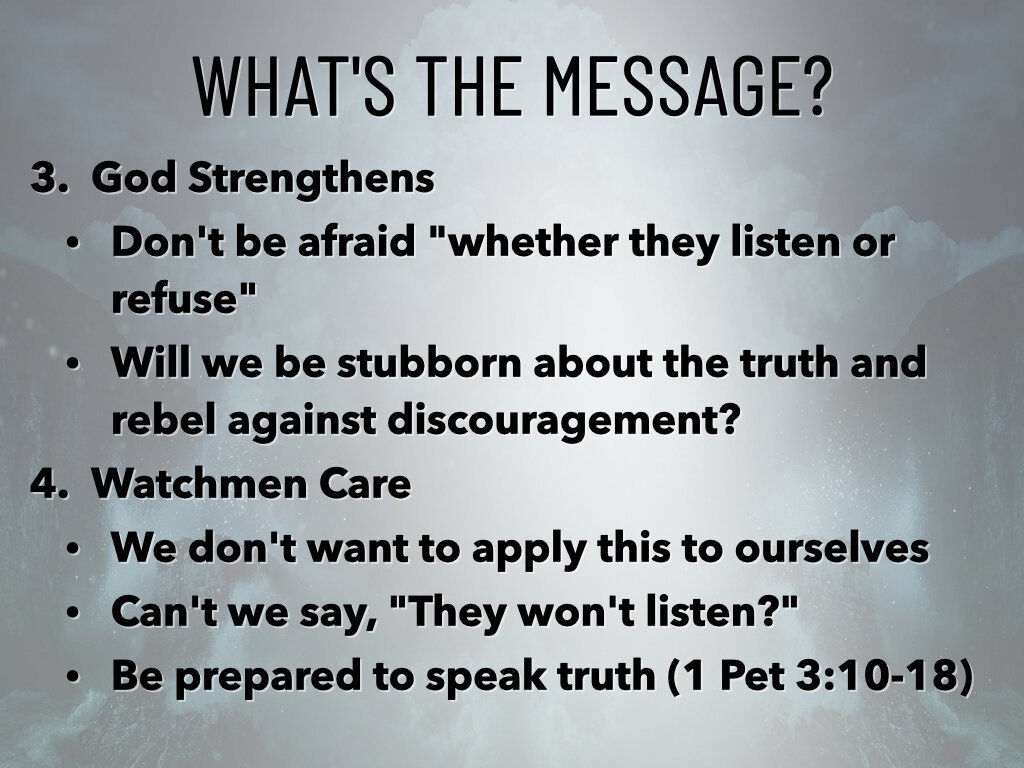Call of a Watchman (Ezekiel 2-3)
The year is 593 BC. Ezekiel and his fellow captives have been away from their homeland for five years, along with their king, Jehoiachin. It was the thirtieth year of Ezekiel's life. Ezekiel was supposed to be a priest. He had spent much of his life preparing to serve in the temple, but now he was in Babylonian exile. Imagine being removed from everything you own and living a life of poverty far away from the only job you have ever trained to do.
All of the exiles would have looked forward to the day they would be allowed to return home. They had probably heard the message of destruction from Jeremiah, but it is doubtful that any of them took it seriously. Every other prophet said God was happy with them. This would all be over in no time.
Suddenly, a stormy wind comes out of the north with a great cloud, and lightning continually comes out. Ezekiel looks amid the cloud and sees a bright gleaming metal. In the bright light, he sees four living creatures with wheels beside them. Over their heads was a throne with a form like a human sitting on it. But this "person" had a gleaming metal appearance from his waist upward. Ezekiel says, "Such was the appearance of the likeness of the glory of the Lord." Notice that this is his best description of God.
Ezekiel falls on his face. Who wouldn't fall on their face at such an appearance?
Ezekiel's Call
Stand Up (2:2-7)
Then, he hears a voice telling him to stand on his feet so that God can speak to him. Ezekiel doesn't move a muscle by his power. He can't. He is powerless before the presence of God. But God sent his spirit into Ezekiel and set him on his feet.
Ezekiel 2:2--7 (ESV) --- 2 And as he spoke to me, the Spirit entered into me and set me on my feet, and I heard him speaking to me. 3 And he said to me, “Son of man, I send you to the people of Israel, to nations of rebels, who have rebelled against me. They and their fathers have transgressed against me to this very day. 4 The descendants also are impudent and stubborn: I send you to them, and you shall say to them, ‘Thus says the Lord God.’ 5 And whether they hear or refuse to hear (for they are a rebellious house) they will know that a prophet has been among them. 6 And you, son of man, be not afraid of them, nor be afraid of their words, though briers and thorns are with you and you sit on scorpions. Be not afraid of their words, nor be dismayed at their looks, for they are a rebellious house. 7 And you shall speak my words to them, whether they hear or refuse to hear, for they are a rebellious house.
What does God want to tell Ezekiel? He is no longer going to be a priest. His work will be to prophesy to the exiles in Babylon. Notice what he calls these exiles. They are a nation of rebels. These men and women who have suffered exile are still a nation of rebels. They don't have an ounce of humility in them. They don't understand that their exile is a call for repentance. Instead of turning to God and seeking out his forgiveness, they just survive while expecting God to bring them back to Jerusalem.
Even though these people are impudent and stubborn, God wants a prophet to go to them and tell them a message of truth. This shows us that God is steadfast in his love. He knows how unlikely it is that stubborn, rebellious people will listen, but he still sends his prophet to them.
He is also confident that Ezekiel's message will make some kind of impact. He says, "They will know that a prophet has been among them. Ezekiel will make a clear statement to the exiles that he is from God. They won't question him like they did Jeremiah.
God also offers Ezekiel words of encouragement. He tells him not to be afraid of them, their words, or their looks. He also offers him an illustration. He says, "Though briers and thorns are with you and you sit on scorpions. Be not afraid..." I don't know about you, but I'm going to have a little anxiety about being around people who are compared to briers and thorns. I'm also going to be afraid that people might put a scorpion under me when I sit down. Can you imagine the words that would be spoken against you for telling everyone that they are wrong? Can you imagine the looks people will give you when you walk by? But God tells Ezekiel that he doesn't have to be afraid even though these things are about to happen to him. Why not?
God doesn't come out and tell him why not. He merely implies what he said to Jeremiah.
Jeremiah 1:18--19 (ESV) --- 18 And I, behold, I make you this day a fortified city, an iron pillar, and bronze walls, against the whole land, against the kings of Judah, its officials, its priests, and the people of the land. 19 They will fight against you, but they shall not prevail against you, for I am with you, declares the Lord, to deliver you.”
God will be with Ezekiel as he speaks God's words to the rebellious people. He does not need to be afraid, "whether they hear or refuse to hear." Did you see that? God points out that Ezekiel shouldn't pay any attention to the result. Have you ever been concerned about what people will think when you tell them God's word? How many times do we ask ourselves, "What if they refuse to hear?" That initial fear may affect our willingness to speak. But God tells Ezekiel that he doesn't have to be afraid of them. Even if they refuse to listen to his message, everything will be okay. Ezekiel can go ahead and expect that to happen because they are "a rebellious house."
Don't Be Like Them (2:8-3:3)
Ezekiel 2:8 (ESV) --- 8 “But you, son of man, hear what I say to you. Be not rebellious like that rebellious house; open your mouth and eat what I give you.”
Next, God focuses on Ezekiel to tell him not to be like them. This is interesting. God knows that Ezekiel comes from these people. The culture and society around him have affected his way of looking at things. Judah has been in a rapid decline morally since David. The faithfulness of men like Hezekiah and Josiah has done little to slow the idolatry and love for this world. To think that Ezekiel is unaffected by that evil world is foolish. But God calls Ezekiel out of that corruption. He is not to be rebellious and stubborn like them. He must listen to what God is telling him and believe it!
Ezekiel 2:8--3:3 (ESV) --- 8 “But you, son of man, hear what I say to you. Be not rebellious like that rebellious house; open your mouth and eat what I give you.” 9 And when I looked, behold, a hand was stretched out to me, and behold, a scroll of a book was in it. 10 And he spread it before me. And it had writing on the front and on the back, and there were written on it words of lamentation and mourning and woe. 1 And he said to me, “Son of man, eat whatever you find here. Eat this scroll, and go, speak to the house of Israel.” 2 So I opened my mouth, and he gave me this scroll to eat. 3 And he said to me, “Son of man, feed your belly with this scroll that I give you and fill your stomach with it.” Then I ate it, and it was in my mouth as sweet as honey.
Then, God hands Ezekiel a scroll that is written on both sides. Typically scrolls were written on one side, but God provided a massive amount of information on this scroll. It contained too much for one side of a scroll. That scroll contains words of lamentation, mourning, and woe. As we study Ezekiel's book, we understand that God will destroy Jerusalem instead of letting them return. It would be the worst news any of the exiles could receive. But Ezekiel is told to eat this scroll.
Why would Ezekiel eat the scroll? When we eat something, it becomes a part of us. God wants Ezekiel to take his words in and feel what God feels. He wants him to make this message a part of who Ezekiel is. The mourning, lamentation, and woe convey the message with the right sense. As you read through the book, you will notice Ezekiel acting out many scenes for the exiles. He needs to give the right impression to give the right message. Plus, he needs to feel what God feels to obey.
When he eats the scroll, he finds it to be sweet in his mouth. God's mourning, lamentation, and woe are sweet because they indicate God's tender love and care for his people. He is not happy about judging them. He takes no pleasure in the death of the wicked. He would prefer they turn from their evil and do what is right. We get this idea twice in the book (Ezekiel 18, 33)
Speak It (3:4-11)
Ezekiel 3:4--11 (ESV) --- 4 And he said to me, “Son of man, go to the house of Israel and speak with my words to them. 5 For you are not sent to a people of foreign speech and a hard language, but to the house of Israel--- 6 not to many peoples of foreign speech and a hard language, whose words you cannot understand. Surely, if I sent you to such, they would listen to you. 7 But the house of Israel will not be willing to listen to you, for they are not willing to listen to me: because all the house of Israel have a hard forehead and a stubborn heart. 8 Behold, I have made your face as hard as their faces, and your forehead as hard as their foreheads. 9 Like emery harder than flint have I made your forehead. Fear them not, nor be dismayed at their looks, for they are a rebellious house.” 10 Moreover, he said to me, “Son of man, all my words that I shall speak to you receive in your heart, and hear with your ears. 11 And go to the exiles, to your people, and speak to them and say to them, ‘Thus says the Lord God,’ whether they hear or refuse to hear.”
After telling Ezekiel to eat the scroll, he tells him to speak his words to them. After those words digest, he wants them shared with those rebellious people. He gives a picture of their rebellion by saying that the same message would change a foreign nation. This sounds like Jonah. But God's people will not repent. He tells Ezekiel that the exiles will not listen to him. They will harden their forehead and their heart.
In response to this, God says that he will do the same to Ezekiel. God wants Ezekiel to have a tender heart when God speaks to him, but he will give Ezekiel a stubborn heart when he sees the people refuse to repent. He will not be affected by their refusal. What a fantastic picture for us of a great prophet!
Overwhelmed (3:12-15)
Ezekiel 3:12--15 (ESV) --- 12 Then the Spirit lifted me up, and I heard behind me the voice of a great earthquake: “Blessed be the glory of the Lord from its place!” 13 It was the sound of the wings of the living creatures as they touched one another, and the sound of the wheels beside them, and the sound of a great earthquake. 14 The Spirit lifted me up and took me away, and I went in bitterness in the heat of my spirit, the hand of the Lord being strong upon me. 15 And I came to the exiles at Tel-abib, who were dwelling by the Chebar canal, and I sat where they were dwelling. And I sat there overwhelmed among them seven days.
This scene wraps up the first vision, but the story is not quite over yet. When God returns Ezekiel, he goes "in bitterness in the heat of his spirit." What does that mean? After he gets back, he doesn't go out and speak anything to anyone. Instead, he just sits there. He has eaten a sweet message from God, but the overall experience has left him bitter, and a hot spirit shows that he is angry. Verse 15 says he sat overwhelmed for seven days.
What would we do? This is a shock to the core. Everything Ezekiel has planned is erased. His whole life is now about the words of God and these rebellious people. He knows that he will be forced to suffer while he tries to save them.
Blow Your Trumpet (3:16-21)
Ezekiel 3:16--21 (ESV) --- 16 And at the end of seven days, the word of the Lord came to me: 17 “Son of man, I have made you a watchman for the house of Israel. Whenever you hear a word from my mouth, you shall give them warning from me. 18 If I say to the wicked, ‘You shall surely die,’ and you give him no warning, nor speak to warn the wicked from his wicked way, in order to save his life, that wicked person shall die for his iniquity, but his blood I will require at your hand. 19 But if you warn the wicked, and he does not turn from his wickedness, or from his wicked way, he shall die for his iniquity, but you will have delivered your soul. 20 Again, if a righteous person turns from his righteousness and commits injustice, and I lay a stumbling block before him, he shall die. Because you have not warned him, he shall die for his sin, and his righteous deeds that he has done shall not be remembered, but his blood I will require at your hand. 21 But if you warn the righteous person not to sin, and he does not sin, he shall surely live, because he took warning, and you will have delivered your soul.”
After the seven days are up, God speaks to Ezekiel again. He tells him that he is Israel's watchman. Like one who sits on the wall, he must watch for the enemy and blow his trumpet to warn everyone before they are destroyed. But this is an image. Ezekiel is not sitting on a wall. He will call out God's word to warn the people about God's judgment against them. God is their enemy because they are wicked and rebellious.
What happens to the watchman if he doesn't blow his trumpet? Many people die, and the watchman will be put to death as well. He can't take a nap. He has a critical job. If God wants to warn the wicked of his judgment, Ezekiel better warn them. Then, their judgment will be on their head when they don't repent, and he will deliver his soul. But if Ezekiel refuses to tell them, their blood will be on his head. He will be judged for being wicked.
Verse 20 is very odd. He says that a righteous person might turn from being righteous and do what is evil. That much we can imagine in our minds. We may know righteous people who turn from righteousness and fall away. Then, God says that he might lay a stumbling block before them, and he shall die because Ezekiel didn't warn him. A righteous person is not counted righteous when he turns from his righteousness and does evil. This is not a works-based system. It's not a balance of righteous deeds vs. evil deeds. It's about faithfulness. That righteous person has to turn from their evil deeds and seek God's forgiveness. God wants humble submission. Otherwise, he will put a stumbling block before them.
Why would God do that? Does he want people to fall? Of course not. God wants Ezekiel to see the urgency of his message. If he doesn't respond and warn the righteous person, it may soon be too late, and he will be guilty. He might risk waiting till it's too late to blow the trumpet.
Do Nothing Else (3:22-27)
The final part of this chapter reveals that God doesn't want Ezekiel to do anything else. For the next seven years, Ezekiel will be forced to stay in his house. He cannot leave unless God tells him to. He also cannot speak. The only words that Ezekiel can say are the words God gives him to say.
Imagine how people would view Ezekiel when he stops all social interaction. Every time Ezekiel is doing something or saying something, they would want to know. This would create a lot of intrigue around the events in the life of Ezekiel. They would know a prophet is among them.
What Is The Message?
1. Grace
The most amazing part about this text is that God wants these stubborn, rebellious people to know the truth. Most of us would write them off as a lost cause. Why not start over? God doesn't want to kill off all of the evil people. He wants to transform them. The message of Ezekiel is God's work to transform their hearts.
Application - God also wants the stubborn, rebellious people around us to hear the truth. We might write them off as hopeless. After all, we live in a time of moral decline. Very few people know what God's word says. Everyone is stubborn and rebellious against the truth. They all want to believe their own version of the truth. Do we see that God wants to transform them and renew their hearts and minds?
We need to see ourselves as stubborn and rebellious. I have seen this in myself lately as Joseph struggles with life. When he gets tired, he will cry and say, "But I want to do this!" Or he will say, "But I don't want to go to bed!" It's the most heart-wrenching cry because you know he means it with everything inside of him. Going to bed or doing whatever we tell him seems like the most challenging task because he is so focused on what he wants to do. After listening to that, I feel some of what God feels. How many times have I said, "But I don't want to do that!" I don't want to read your word. I don't want to pray. I don't want to give up my money. How many times have I said, "But I want to!" I want to focus all of my attention on this thing that will leave me empty. I want to waste my time with TV, Games, or Social Media. I want to keep doing this sin!
Why are we so stubborn and hard-headed? Our society and culture are working against us on this. We must not think that we are unaffected. But God calls for us not to be stubborn like they are stubborn.
2. Understanding
As God calls Ezekiel, we see that God wants his prophet to know him. God provides him with a scroll full of mourning to eat and take in. His work is going to be miserable, but it's okay because God is miserable with him. He is on God's side, sharing God's perspective.
Application - We are also called to know God. But instead of a scroll, we are given a Son of God. Jesus says in John 6, "Unless you eat the less of the Son of Man and drink his blood, you have no life in you." Jesus was not talking about the Lord's Supper when he said this. In the context of John 6, he was talking about taking in his life and his sacrifice. The flesh and blood of Jesus must become a part of who we are like Ezekiel's scroll. They give us an understanding of the love, mercy, and lamentation of God over sin. He wants people to be saved from their sin so severely that he will give us his son. This is how we know him.
3. Strength
We also see God wants Ezekiel to be unafraid. He can expect everyone to refuse his message and lash out against him. But he doesn't have to be afraid. God is with him. God will make his forehead as hard as theirs. Ezekiel only needs to have a tender heart toward God. He will be strengthened to overcome the discouragement that lies ahead.
Application - How important is this for us to see? We don't have to be afraid! They are stubborn people, and they will refuse to listen to the truth no matter how perfectly we speak it. If someone wants to know the truth and are hungry for it, it won't matter how bad we are at speaking the truth. They will want to know more. It's not about us. It's about their stubborn or tender hearts.
I love how God tells Ezekiel that he will make him stubborn and rebellious. His stubbornness will be against the people instead of against God. All of their efforts to discourage Ezekiels prophesying will be fruitless. He will be relentless about telling the truth. Wouldn't we love to rebel against discouragement? Have we asked God to give us a hard forehead against the rebellious people of our day?
4. Care
Finally, we see that God will hold Ezekiel accountable for not blowing his trumpet. Ezekiel is responsible for warning the people who sin as God reveals that sin to him. If he doesn't care about the people, he better get his act together because it will cost him his life.
Application - If you are like me, you want to downplay this. God doesn't hold us as accountable as he holds Ezekiel. Ezekiel is God's prophet, and God is talking to him directly. We don't have what Ezekiel has. Therefore, we are off the hook. But are we? If we see a wicked person lost and worthy of judgment, what does God expect of us? Can we say, "They won't listen?" God doesn't seem to care about the outcome. Maybe we see a righteous person turning from righteousness to do evil. Should we assume that God will forgive them because they are overall righteous?
What if God considers us to be the light of the world? Remember what James says, "Whoever knows the right thing to do and fails to do it, for him it is sin."
We don't want to go around judging everyone and assuming that every thought in our mind is God's word. We don't know God's feelings toward every person because we don't know their heart. So who should we warn, and how should we warn them? Let's look at the New Testament. First, let's look at a lengthy passage from Peter. Then, let's look at a short passage from Paul. Peter says something that sounds a lot like Ezekiel's call.
1 Peter 3:10--18 (ESV) --- 10 For “Whoever desires to love life and see good days, let him keep his tongue from evil and his lips from speaking deceit; 11 let him turn away from evil and do good; let him seek peace and pursue it. 12 For the eyes of the Lord are on the righteous, and his ears are open to their prayer. But the face of the Lord is against those who do evil.” 13 Now who is there to harm you if you are zealous for what is good? 14 But even if you should suffer for righteousness’ sake, you will be blessed. Have no fear of them, nor be troubled, 15 but in your hearts honor Christ the Lord as holy, always being prepared to make a defense to anyone who asks you for a reason for the hope that is in you; yet do it with gentleness and respect, 16 having a good conscience, so that, when you are slandered, those who revile your good behavior in Christ may be put to shame. 17 For it is better to suffer for doing good, if that should be God’s will, than for doing evil. 18 For Christ also suffered once for sins, the righteous for the unrighteous, that he might bring us to God, being put to death in the flesh but made alive in the spirit,
All who are refusing to submit to God and Jesus must be warned. But notice how Peter encourages us to do so with gentleness and respect. We should not fear their words or looks. Jesus endured much worse on our behalf.
Colossians 4:6 (ESV) --- 6 Let your speech always be gracious, seasoned with salt, so that you may know how you ought to answer each person.
Notice that Paul says a similar thing. He wants us to always be gracious in our speech and to season our words with salt. In other words, he wants us to use tact and remember the grace of God given to us. As God forgives us, we must be forgiving of others.
Conclusion
The call of Ezekiel relates to us. We are not prophets given inspiration from God like Ezekiel, and we better not claim to be. But we know that God extends grace toward rebellious people because he extended it toward me. We can understand God because he gave us Jesus to eat. God wants to give us strength and resilience as we face rebellious people. So we need to be encouraged and warn those around us of their coming judgment so they can be saved. For Ezekiel, his life depended on him telling the truth to the people around us. If we know the right thing to do and fail to do it, it is also a sin for us.

